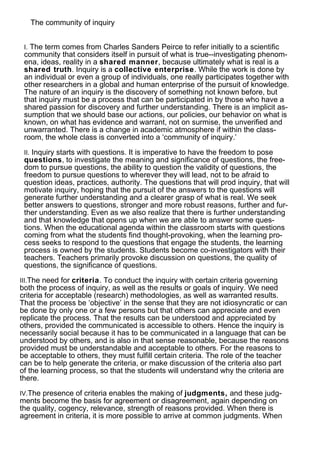
The Community of Inquiry, Dr. Zosimo Lee
- 1. The community of inquiry I. The term comes from Charles Sanders Peirce to refer initially to a scientific community that considers itself in pursuit of what is true--investigating phenom- ena, ideas, reality in a shared manner, because ultimately what is real is a shared truth. Inquiry is a collective enterprise. While the work is done by an individual or even a group of individuals, one really participates together with other researchers in a global and human enterprise of the pursuit of knowledge. The nature of an inquiry is the discovery of something not known before, but that inquiry must be a process that can be participated in by those who have a shared passion for discovery and further understanding. There is an implicit as- sumption that we should base our actions, our policies, our behavior on what is known, on what has evidence and warrant, not on surmise, the unverified and unwarranted. There is a change in academic atmosphere if within the class- room, the whole class is converted into a ‘community of inquiry.’ II. Inquiry starts with questions. It is imperative to have the freedom to pose questions, to investigate the meaning and significance of questions, the free- dom to pursue questions, the ability to question the validity of questions, the freedom to pursue questions to wherever they will lead, not to be afraid to question ideas, practices, authority. The questions that will prod inquiry, that will motivate inquiry, hoping that the pursuit of the answers to the questions will generate further understanding and a clearer grasp of what is real. We seek better answers to questions, stronger and more robust reasons, further and fur- ther understanding. Even as we also realize that there is further understanding and that knowledge that opens up when we are able to answer some ques- tions. When the educational agenda within the classroom starts with questions coming from what the students find thought-provoking, when the learning pro- cess seeks to respond to the questions that engage the students, the learning process is owned by the students. Students become co-investigators with their teachers. Teachers primarily provoke discussion on questions, the quality of questions, the significance of questions. III.The need for criteria. To conduct the inquiry with certain criteria governing both the process of inquiry, as well as the results or goals of inquiry. We need criteria for acceptable (research) methodologies, as well as warranted results. That the process be ‘objective’ in the sense that they are not idiosyncratic or can be done by only one or a few persons but that others can appreciate and even replicate the process. That the results can be understood and appreciated by others, provided the communicated is accessible to others. Hence the inquiry is necessarily social because it has to be communicated in a language that can be understood by others, and is also in that sense reasonable, because the reasons provided must be understandable and acceptable to others. For the reasons to be acceptable to others, they must fulfill certain criteria. The role of the teacher can be to help generate the criteria, or make discussion of the criteria also part of the learning process, so that the students will understand why the criteria are there. IV.The presence of criteria enables the making of judgments, and these judg- ments become the basis for agreement or disagreement, again depending on the quality, cogency, relevance, strength of reasons provided. When there is agreement in criteria, it is more possible to arrive at common judgments. When
- 2. The community of inquiry there are disagreements, sometimes it is because there is a lack or no agree- ment on the criteria for judgments. Having a discussion on the criteria become a meta-discussion, what are our criteria so that we can arrive at common judg- ments. Learning must be about having the competence to make better judg- ments---professionally, socially, politically, culturally. Better judgments mean bet- ter decisions and consequently better actions. V. Collective dialogue. Given a particular question, there can be a dia- logue on the meaning and significance of the question, and the possibility of providing viable and acceptable answers to the question opens individual minds to so many possibility and can expand the understand that each may have of the question and the possible answers. We educate each other and expand our knowledge and understanding through the answers that each one provides to the focal question. The collective dialogue that occurs, even when there are disagreements or especially when there are disagreements, ex- pands our collective horizon as to what the question indicates regarding what is true. Knowledge production is a collective and joint process, warranted by evidence, proof, reasoning. VI. Collective thinking. The questions gives focus to inquiry, the process of inquiry generates possible answers to the question, the joint or common pursuit of probable answers or solutions engages a community of persons engaged in a search for valid responses to a source of perplexity and won- der, and the various answers expands the horizon of those wanting to enlight- en themselves about what they are perplexed about. The question, the pro- cess, the probable answers unite in creating a community that engages in collective inquiry and thinking. The focus on thinking considers that being able to do better thinking is a craft. Hence much as we like craftsmanship in our work and other activities, there must also be hallmarks of craftsmanship in our thinking. VII. Lauren B. Resnick’s higher-order thinking. judgment, criteria, self-regulation and meaning elaborative, nuanced, complex and multiple “The thinker’s task is to construct meaning and impose structure on situations rather than to expect to find them already apparent.” (Education and Learning to Think. Washington D.C. National Academy Press, 1987) p. 44.
